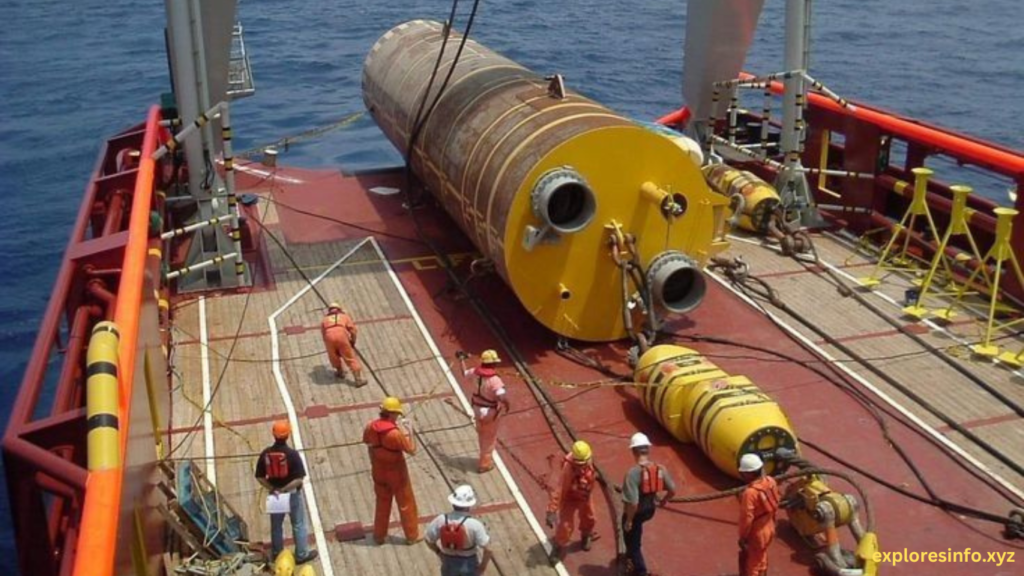The oil and gas industry is one of the most lucrative sectors in the global economy, but it is also one of the most dangerous. Offshore oil rig workers face a unique set of risks and challenges every day, from heavy machinery and hazardous materials to extreme weather conditions and the inherent dangers of working in remote locations. Despite stringent safety regulations and protocols, accidents on oil rigs are not uncommon, and when they occur, the consequences can be devastating.
For those who have been injured in oil rig accidents, the road to recovery can be long and arduous. Medical bills, lost wages, and the physical and emotional toll of the injury can create significant financial and personal strain. In such situations, experienced oil rig injury attorneys play a crucial role in helping injured workers and their families navigate the complex legal landscape to secure the justice and compensation they deserve.
This article delves into the world of oil rig injury attorneys, exploring the types of injuries that occur on oil rigs, the legal rights of offshore workers, and how skilled attorneys fight for their clients’ rights. We will also discuss the importance of choosing the right attorney, the process of filing a claim, and the types of compensation available to injured workers.
The Dangers of Working on an Oil Rig
Offshore oil rigs are inherently hazardous environments.
- Fires and Explosions: The presence of flammable gases and liquids makes oil rigs particularly susceptible to fires and explosions. These incidents can cause severe burns, respiratory issues, and even fatalities.
- Falls: Oil rigs are often several stories high, and workers are required to work at significant heights. Falls from rigs, scaffolding, or ladders can result in broken bones, spinal cord injuries, and traumatic brain injuries.
- Equipment Malfunctions: Heavy machinery and equipment are integral to oil rig operations. Malfunctions or improper use can lead to crush injuries, amputations, and other serious injuries.
- Chemical Exposure: Workers may be exposed to hazardous chemicals, which can cause respiratory problems, skin conditions, and long-term health issues.
- Transportation Accidents: Workers are often transported to and from oil rigs via helicopters or boats. Accidents during transportation can result in serious injuries or fatalities.
- Fatigue and Human Error: Long hours and physically demanding work can lead to fatigue, increasing the likelihood of accidents caused by human error.
Legal Rights of Offshore Workers
Offshore workers are protected by a unique set of laws and regulations designed to ensure their safety and provide recourse in the event of an injury. The two primary legal frameworks that govern offshore workers’ rights are:
- The Jones Act: Also known as the Merchant Marine Act of 1920, the Jones Act provides seamen with the right to sue their employers for negligence if they are injured while working on a vessel, including oil rigs. Under the Jones Act, injured workers can seek compensation for medical expenses, lost wages, pain and suffering, and other damages.
- The Longshore and Harbor Workers’ Compensation Act (LHWCA): This federal law provides compensation to maritime workers who are not covered by the Jones Act, such as dockworkers and longshoremen. The LHWCA covers medical expenses, rehabilitation costs, and a portion of lost wages.
In addition to these federal laws, offshore workers may also have claims under general maritime law, which governs accidents that occur on navigable waters. This body of law allows injured workers to seek compensation for unseaworthiness, which refers to a vessel’s failure to provide a safe working environment.
The Role of Oil Rig Injury Attorneys
Experienced oil rig injury attorneys specialize in representing offshore workers who have been injured due to negligence, unseaworthiness, or other factors. These attorneys play a critical role in helping injured workers navigate the complex legal system and secure the compensation they deserve. Here are some of the key ways in which oil rig injury attorneys assist their clients:
- Case Evaluation: The first step in any legal claim is a thorough evaluation of the case. Attorneys will review the circumstances of the accident, gather evidence, and determine the best course of action. This may involve consulting with experts, such as accident reconstruction specialists and medical professionals, to build a strong case.
- Filing Claims: Oil rig injury attorneys are well-versed in the intricacies of maritime law and the specific requirements for filing claims under the Jones Act, LHWCA, and other relevant laws.
- Negotiating with Insurance Companies: Insurance companies often try to minimize payouts to injured workers. Skilled attorneys will negotiate with insurers on behalf of their clients to secure a fair settlement that covers medical expenses, lost wages, and other damages.
- Litigation: If a fair settlement cannot be reached, oil rig injury attorneys are prepared to take the case to court. They will present the evidence, argue the case, and fight for their clients’ rights in front of a judge and jury.
- Advocating for Clients: Throughout the legal process, oil rig injury attorneys serve as advocates for their clients. They provide guidance, answer questions, and ensure that their clients’ best interests are always prioritized.

Choosing the Right Oil Rig Injury Attorney
Selecting the right attorney is crucial to the success of an oil rig injury claim. Here are some factors to consider when choosing an attorney:
- Experience: Look for an attorney with a proven track record of handling oil rig injury cases. Experience in maritime law and familiarity with the Jones Act and LHWCA are essential.
- Reputation: Research the attorney’s reputation in the legal community. Read reviews, ask for references, and check their standing with the state bar association.
- Resources: Oil rig injury cases often require significant resources, including access to experts and investigators. Ensure that the attorney has the necessary resources to build a strong case.
- Communication: Choose an attorney who communicates clearly and regularly. You should feel comfortable asking questions and confident that your attorney is keeping you informed throughout the process.
- Contingency Fees: Many oil rig injury attorneys work on a contingency fee basis, meaning they only get paid if you win your case. This arrangement can provide peace of mind and ensure that your attorney is motivated to secure the best possible outcome.
The Process of Filing an Oil Rig Injury Claim
Filing an oil rig injury claim can be a complex and time-consuming process. Here is an overview of the steps involved:
- Seek Medical Attention: The first priority after an injury is to seek medical attention. Your health and well-being are paramount, and prompt medical treatment can also strengthen your case by documenting the extent of your injuries.
- Report the Accident: Report the accident to your employer as soon as possible. Failure to report the accident in a timely manner could jeopardize your claim.
- Consult an Attorney: Contact an experienced oil rig injury attorney to discuss your case. They will guide you through the process and help you understand your rights and options.
- Investigation: Your attorney will conduct a thorough investigation into the accident. They are involved in investigation.
- Filing the Claim: Your attorney will file the necessary claims on your behalf, ensuring that all paperwork is completed accurately and submitted within the required deadlines.
- Negotiation: Your attorney will negotiate with the insurance company to secure a fair settlement. If a settlement cannot be reached, your attorney will prepare for litigation.
- Litigation: If the case goes to court, your attorney will present the evidence and argue your case in front of a judge and jury.
- Resolution: The case will be resolved either through a settlement or a court verdict. Your attorney will ensure that you receive the compensation you are entitled to.
Types of Compensation Available
Injured offshore workers may be entitled to various types of compensation, depending on the circumstances of the accident and the extent of their injuries. Here are some of the common types of compensation available:
- Medical Expenses: Compensation for past and future medical expenses, including hospital stays, surgeries, medications, and rehabilitation.
- Lost Wages: Compensation for lost wages, including past and future earnings, if the injury prevents the worker from returning to work.
- Pain and Suffering: Compensation for the physical pain and emotional suffering caused by the injury.
- Disability Benefits: Compensation for permanent or temporary disability, including loss of earning capacity.
- Vocational Rehabilitation: Compensation for vocational rehabilitation services, such as job training and placement, if the injury prevents the worker from returning to their previous occupation.
- Punitive Damages: In cases of gross negligence or willful misconduct, the court may award punitive damages to punish the responsible party and deter similar behavior in the future.

Conclusion
Offshore oil rig workers face significant risks every day, and when accidents occur, the consequences can be life-altering. Experienced oil rig injury attorneys play a crucial role in helping injured workers and their families navigate the complex legal system to secure the justice and compensation they deserve. By understanding the dangers of working on an oil rig, the legal rights of offshore workers, and the importance of choosing the right attorney, injured workers can take important steps to protect their rights their future.
If you or a loved one has been injured in an oil rig accident, don’t hesitate to seek legal representation. An experienced oil rig injury attorney can provide the guidance and support you need to navigate the legal process and secure the compensation you deserve. Remember, you don’t have to face this challenging time alone—help is available, and justice is within reach.
Frequently Asked Questions (FAQs) About Oil Rig Injury Attorneys: Compassionate Answers for Offshore Workers and Families
When you or a loved one has been injured in an oil rig accident, it’s natural to have questions about your rights, the legal process, and how to move forward. Below, we’ve answered some of the most common questions in a way that prioritizes empathy and understanding, because we know this is a difficult time for you.
1. What should I do first if I’ve been injured on an oil rig?
Your health and safety come first. After addressing your health, report the accident to your employer as soon as possible. Then, contact an experienced oil rig injury attorney to discuss your case. They can help you understand your rights and guide you through the next steps.
2. Can I really sue my employer if I’m injured on the job?
Yes, in many cases, you can. Offshore workers are protected by specific laws like the Jones Act, which allows you to sue your employer if their negligence contributed to your injury. For example, if faulty equipment, lack of training, or unsafe working conditions caused your accident, you may have a valid claim. An experienced attorney can help you determine whether your employer’s actions (or lack thereof) played a role in your injury.
3. What if I signed a waiver or was told I couldn’t sue?
Many offshore workers are told they can’t sue their employer or that they’ve waived their rights by signing a contract. However, these claims are often misleading. Under federal maritime laws like the Jones Act and the Longshore and Harbor Workers’ Compensation Act (LHWCA), you have the right to seek compensation regardless of what your employer says. Don’t let anyone discourage you from pursuing justice—consult an attorney to understand your true rights.
4. How long do I have to file a claim after an oil rig injury?
The time limit to file a claim, known as the statute of limitations, varies depending on the laws that apply to your case. For example, under the Jones Act, you typically have three years from the date of the injury to file a claim. However, it’s crucial to act quickly. Evidence can disappear, witnesses’ memories may fade, and delays can weaken your case. The sooner you speak with an attorney, the better your chances of securing a strong outcome.
5. What if the accident was partially my fault? Can I still recover compensation?
Yes, you may still be able to recover compensation, even if you believe you were partially at fault. Under the Jones Act, you can still pursue a claim as long as your employer’s negligence played any role in the accident. For example, if you were 70% at fault and your employer was 30% at fault, you could still recover 30% of the damages.
6. What kind of compensation can I recover after an oil rig injury?
The compensation you can recover depends on the specifics of your case, but it may include:
- Medical expenses: Past and future costs for surgeries, medications, therapy, and rehabilitation.
- Lost wages: Compensation for income you’ve lost due to the injury, as well as future earnings if you’re unable to return to work.
- Pain and suffering: Compensation for the physical pain and emotional trauma caused by the injury.
- Disability benefits: If your injury results in a temporary or permanent disability, you may be entitled to additional compensation.
- Punitive damages: In rare cases where the employer’s actions were especially reckless or intentional, punitive damages may be awarded.
Your attorney will work to ensure you receive the full compensation you deserve.
- How long will it take to resolve my case?
Some cases are resolved through settlement negotiations in a matter of months, while others may take longer, especially if they go to trial. Your attorney will work diligently to move your case forward as quickly as possible while ensuring you receive fair compensation. They’ll keep you informed every step of the way so you know what to expect.
8. What if my loved one was killed in an oil rig accident? Can I file a claim?
Yes, if your loved one lost their life in an oil rig accident, you may be able to file a wrongful death claim. These claims can help cover funeral expenses, lost income, and the emotional pain of losing a loved one. While no amount of money can replace your loss, a wrongful death claim can provide financial stability and hold the responsible parties accountable. An attorney can guide you through this difficult process with compassion and care.
9. How much does it cost to hire an oil rig injury attorney?
Most oil rig injury attorneys work on a contingency fee basis, which means you don’t pay anything upfront. Instead, your attorney only gets paid if they win your case, typically taking a percentage of the settlement or award. This arrangement ensures that your attorney is motivated to fight for the best possible outcome and that you can access legal representation without worrying about upfront costs.
10. Why do I need an attorney? Can’t I handle this on my own?
While it’s possible to handle a claim on your own, doing so can be incredibly challenging. Oil rig injury cases involve complex laws, multiple parties (employers, insurance companies, etc.), and often require expert testimony. Without legal expertise, you may miss out on compensation you’re entitled to or make mistakes that weaken your case. An experienced attorney knows how to navigate these challenges, advocate for your rights, and maximize your compensation.
11. How do I choose the right attorney for my case?
Choosing the right attorney is one of the most important decisions you’ll make. Look for an attorney with:
- Experience in maritime law and oil rig injury cases.
- A proven track record of success in securing fair settlements or verdicts.
- Compassion and understanding for what you’re going through.
- A commitment to clear communication and keeping you informed throughout the process.
Don’t hesitate to ask questions during your initial consultation to ensure you feel comfortable and confident in your choice.
12. What if I’m afraid of retaliation from my employer?
It’s understandable to feel worried about retaliation, but federal laws protect you from being fired, demoted, or otherwise punished for filing a claim. If your employer retaliates against you, your attorney can help you take legal action to hold them accountable. Your safety and rights are the top priority.
13. Can I still work while my case is ongoing?
Yes, you can continue working if your injuries allow it. However, if your injuries prevent you from performing your job, your attorney can help you seek compensation for lost wages and other damages. Be honest with your attorney about your situation so they can build the strongest case possible.
14. What if I’m not sure if I have a case?
If you’re unsure whether you have a valid claim, the best thing to do is consult an experienced oil rig injury attorney. Most attorneys offer free consultations, so you can discuss your situation without any financial risk. They’ll evaluate your case, explain your options, and help you decide the best course of action.
15. How can an attorney help me emotionally during this process?
Dealing with an oil rig injury can be overwhelming, both physically and emotionally. A compassionate attorney doesn’t just handle the legal aspects of your case—they also provide support and reassurance during this challenging time. They’ll listen to your concerns, answer your questions, and fight tirelessly to ease your burden so you can focus on healing.
Final Thoughts
If you or a loved one has been injured in an oil rig accident, you don’t have to face this alone. Experienced oil rig injury attorneys are here to help you navigate the legal process, fight for your rights, and secure the compensation you need to move forward. Remember, you deserve justice, and there are people who care deeply about helping you achieve it. Reach out to an attorney today to take the first step toward healing and recovery.
